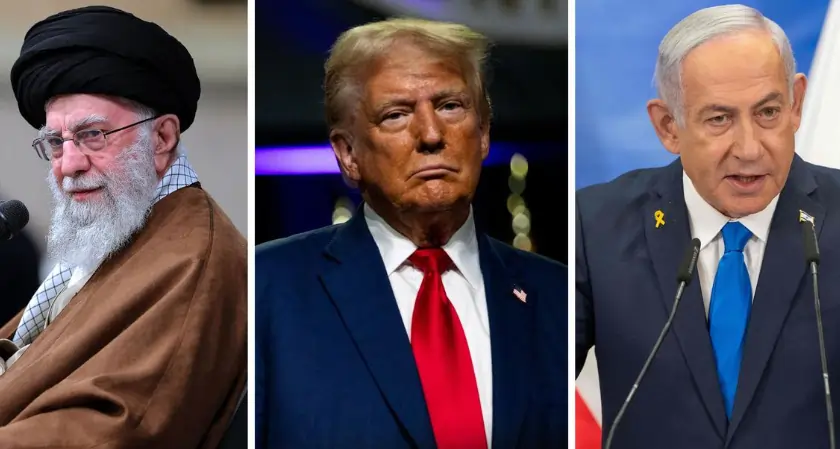Home Others Politics Understanding the Iran-Israel ...
Understanding the Iran-Israel Conflict: Trump’s Calculated Gamble
Politics

Business Fortune
27 June, 2025
We are all aware of the ongoing conflict between Israel and Iran. In order to demonstrate their might to the world by winning this war, both nations and prime ministers are standing still. Israeli Prime Minister Benjamin Netanyahu has stated that they launched a massive bombing campaign against Iran last week in an effort to destroy the nation's nuclear program. Iran retaliated with missiles, but Israel's military superiority was evident, therefore it had to destroy Iran's nuclear facilities throughout the nation.
Trump's Position: Supporting Israel in the Face of Previous Reluctance
However, President Donald Trump has given Israel's present campaign significant military and rhetorical backing. Trump has been insisting that he wants to sign a nuclear deal with Iran for months and has withdrawn from the accord that was reached by Barack Obama's government in 2018. Despite his seeming reluctance to support an Israeli assault, he has already threatened Iran and its Supreme Leader on many occasions and called for the evacuation of Tehran. In an apparent attempt to strike Iran's Fordow Fuel Enrichment Plant, which is believed to be inaccessible without US armaments, he has alluded to the US officially joining the conflict.
Professional Perspective: Aaron David Miller's Opinion
Aaron David Miller, a senior fellow at the Carnegie Endowment for International Peace, discussed this possibility and the US's role in the conflict with Isaac Chotiner, a writer for the New Yorker. Previously in the State Department, he participated in decades of Middle East peace negotiations, particularly at the end of the Clinton Administration. We discussed why many continue to misunderstand Trump's foreign policy stance, what the Iran crisis teaches us about the U.S.-Israeli connection, and why Trump decided to support Israel's fight against Iran. Our conversation has been condensed for length and clarity.
Trump's Predicament: Unwilling Peacemaker, Reluctant Warrior
Aaron David Miller claims that the Trump administration's engagement in the Israel-Iran conflict demonstrates that, while he has failed to find a solution to end the conflict or reduce the likelihood of American intervention, he is a president who fundamentally does not want a major conflict and did not want to involve the United States in one. His issue is that. F-35s are flying about here. The US uses Aegis missile systems. The Patriots have arrived. He has given the Israelis a significant political edge. He has battled back many MAGA supporters who think that supporting Israel is a waste of money. Moreover, he has now provided rhetorical backing.
Why Offer Support Right Now? Image over Ideology
According to the White House, US President Donald Trump will make a decision in the next two weeks on the US's active involvement in the Iran-Israel dispute.
The White House now claims that Donald Trump will make a decision within two days about the US's active involvement in the Iran-Israel crisis.
The point at hand is why Trump is acting in this way when he doesn't want to become involved in this dispute. Therefore, Isaac Chotiner says that the question, "How do I look?" is constantly present. Am I being tricked? Am I coming across as weak? Did I overstate the likelihood of a deal with Iran or overcommit? I believe he is attempting to turn a need into a virtue. However, Trump had the ability, the temperament, and the authority to order Netanyahu to wait and, at the very least, to buy himself some time once he was informed that the Israelis were going to launch an attack.
Infractions: A Change in U.S.-Israeli Relations
The Times said on Tuesday that the Administration felt essentially trapped and that Netanyahu was still planning to attack Iran militarily. They had to acquiesce to some degree since they couldn't stop it. It seems that you are suggesting that they actually had some authority.
Aaron then went on to discuss his ideas. He says this is not a generally held attitude and that not many people share it. Every Republican and Democratic president, from Jimmy Carter to George W. Bush, has never done what Donald Trump has done in and around Israel during the last six weeks. The U.S.-Israeli relationship has been regulated by three basic political laws of gravity, two of which he has entirely violated. The first is that there is no daylight.
The “No Daylight” Principle
He authorized his hostage negotiator in March to begin negotiations without Israel's approval with Hamas, a group that has already killed American citizens and Israeli-American dual nationals. Unbeknownst to the Israeli Prime Minister, he reached a deal with the Houthis that said a truce would be maintained as long as they did not attack our naval facilities. He said nothing about drones and ballistic missiles being employed against Israel. Then, in spite of Netanyahu's objections, he removed sanctions on the newly elected Syrian leader. He called Netanyahu from Budapest to Washington in April as well. Presumably, the prime minister thought he had come to discuss reduced rates. Trump then announces that he has started direct discussions with Iran while the Israeli prime minister stands next to him. No other American president would have taken this action. The no-daylight rule is being dropped because of this.
The second is a lack of consideration for political consequences or expenses. Someone would have called for a Democratic president to be ousted from office if they had engaged in the acts Aaron just described. Trump has significantly more freedom than any other American president to deal more critically and independently with Israel's current prime minister. Additionally, Trump has had this position since his first term, when he believed Netanyahu was using him. Unlike Joe Biden, he has less emotional attachment to the idea of Israel, its people, and its security. He sees Israel as a means to an end.
Is Nobel Peace Prize Trump’s Ultimatum?
Third, the connection has been governed by the political law of gravity of aversion to substantial and continuous pressure. Even if he had broken the first two, he would not or could not finish at number three. He was unable to say, "Look, you know, I know you have got to do what you have got to do, but I can't be there for you" on an issue that may have affected American lives, American stocks, and American interests. And I need more time. Although he may not have stated "Attaboy" and given his approval, it is clear that he did not object.
Aaron said that Trump is now in charge of the U.S.-mediated Russia-Ukraine, Israel-Hamas, and Israel-Iran problems. He has no realistic strategy for trying to influence or control any of them on behalf of the United States. He is situational. He's a transactional individual. In the end, he has no strategy. Despite his misgivings, he did not dismiss Netanyahu's proposal when it was put to him. And once the plan was executed, he responded without any more general fear of what would occur the next day.
A Transactional Leader in a Turbulent World
Donald Trump's essentially transactional approach to foreign policy is shown by his handling of the Iran-Israel dispute. His choices are driven more by optics, leverage, and short-term political gain than by long-term strategy, even if he may present himself as a hesitant warrior or self-styled peacemaker. Trump is motivated by temporal benefit and image management rather than long-term partnerships or moral obligations, as Aaron David Miller notes. Trump exhibits a remarkable degree of flexibility that deviates from decades of bipartisan U.S.-Israeli diplomatic traditions, whether it is by supporting Netanyahu, easing sanctions, or speculating about holding secret talks with Iran. Yet, by eschewing these fundamental tenets—the "no daylight" rule, political cost awareness, and opposition to unbridled escalation—Trump exposes a White House without a clear strategy or direction, adrift in some of the world's most perilous conflicts. His improvised leadership leaves enemies emboldened, allies unsure, and the entire community nervously awaiting what will happen next in a world that longs for stability.


































